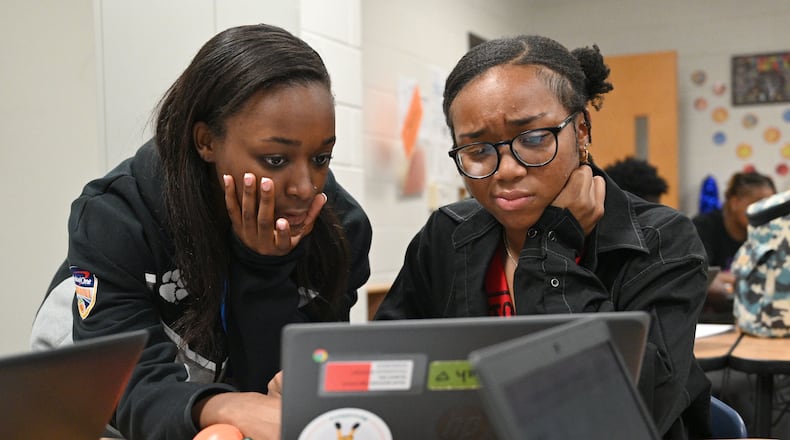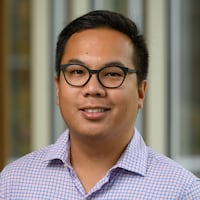Alijah Gabriel went from table to table in a pre-calculus class at South Gwinnett High School answering questions and helping students with their assignment to find the length of legs of a triangle and convert degrees into radians.
But Gabriel isn’t a teacher — just a couple of hours prior, she was learning the same lesson.
Gabriel spends part of each week as a student intern in a math class, helping with classroom responsibilities while absorbing as much information as she can. She’s spent much of high school in Gwinnett’s career and technical education program with a focus on preparing to become a teacher.
Across the country, college teaching programs have seen enrollment decline, and some school districts have struggled to fill positions. Gwinnett, the largest school district in Georgia, has maintained its staffing levels but has raised concerns with turnover that’s outpaced state and national averages. Gwinnett’s program could help fill future gaps.
Gwinnett’s education and training career pathway is larger than ever with about 1,200 students enrolled with an expansion this year into some middle schools, said Beth Autrey, the district’s coordinator of academies and career and technical education. The eighth graders in the expansion will earn high school credits that help with completing the pathway while getting earlier and more specific exposure to the career field.
Juniors and seniors have the opportunity to sign a letter of intent that guarantees them a job interview after college. For students who already want to be educators, this is a chance to get started.
“I want to learn more about what teachers do, and I want to learn how they do it to get myself ready for when I do become a teacher,” said Jahrian Clyde, a student at Duluth Middle School.
Georgia has identified teaching and training as one of its 17 career clusters designed to set students up for success in an in-demand field — ideally in the state.
Gabriel blends in with her peers, sporting an oversized Nike hoodie and occasionally chatting about the spirit week for homecoming. But she mimics the teacher’s demeanor — relaxed but focused as she guides students through problems on their laptops.
Gabriel signed her letter of intent to return to Gwinnett at the end of last school year, both for the job opportunity and the opportunity to give back in her community.
Credit: HYOSUB SHIN / AJC
Credit: HYOSUB SHIN / AJC
“I want to be the teacher that’s teaching more than what’s in the textbook,” she said. “I feel like it’s important to have somebody you feel safe with and can help your dreams and help you get where you’re supposed to be and will support you.”
The district employs nearly 14,000 teachers, hiring about 2,300 new teachers for this school year. About 320 of those jobs were created because of increasing enrollment and to better staff special education.
Y’Shakaa Durham, a South Gwinnett Teaching as a Profession teacher, said lessons about the rewards of teaching are important to the curriculum.
“This is a career that has a hand in every other career,” she said, explaining that her students will go on to a wide variety of jobs and accomplishments after school.
Autrey said the teachers are vital ambassadors to the career cluster: “It’s really important that the teachers are showing the students that they’re excited about teaching and they love their job.”
Students said their internships help put their education lessons into practice.
“I see different point of views and it’s good to see that not all teachers teach the same,” Kimberly Peña, one of Durham’s students, said. That experience has helped Peña shape her approach in her internship with an entrepreneurship teacher. Gabriel said a major takeaway has been adaptability and seeing how teachers manage classrooms and students with different personalities.
Lectures also get into the difficult details of the job that may happen outside of the classroom. Durham digs into access to resources, workplace conditions, labor disputes, legislation and any other topic related to the field.
Pay is always an important discussion.
“I try to be very honest with them when it comes to the pay scale, and I will always say to them, ‘It’s not really about the money you make — it’s what you do with the money that you make,’” Durham said. Autrey noted that the curriculum includes lessons about the retirement system, which she called a “hidden paycheck” that sets them up for life after their career.
For Gabriel, lessons about the challenges of the profession have made her think hard about a teaching career.
She ultimately decided that she wants to be a teacher who advocates for bettering education because “at the end of the day, without teachers, we won’t have anything.”
About the Author
Keep Reading
The Latest
Featured



